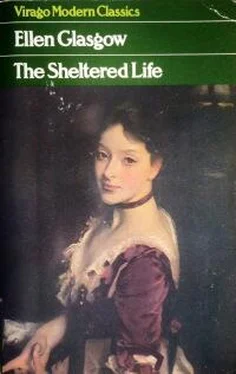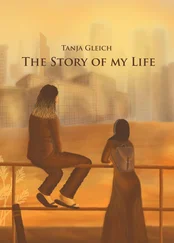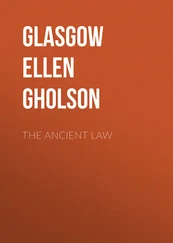Ellen Glasgow - The Sheltered Life
Здесь есть возможность читать онлайн «Ellen Glasgow - The Sheltered Life» весь текст электронной книги совершенно бесплатно (целиком полную версию без сокращений). В некоторых случаях можно слушать аудио, скачать через торрент в формате fb2 и присутствует краткое содержание. Жанр: Классическая проза, на английском языке. Описание произведения, (предисловие) а так же отзывы посетителей доступны на портале библиотеки ЛибКат.
- Название:The Sheltered Life
- Автор:
- Жанр:
- Год:неизвестен
- ISBN:нет данных
- Рейтинг книги:5 / 5. Голосов: 1
-
Избранное:Добавить в избранное
- Отзывы:
-
Ваша оценка:
- 100
- 1
- 2
- 3
- 4
- 5
The Sheltered Life: краткое содержание, описание и аннотация
Предлагаем к чтению аннотацию, описание, краткое содержание или предисловие (зависит от того, что написал сам автор книги «The Sheltered Life»). Если вы не нашли необходимую информацию о книге — напишите в комментариях, мы постараемся отыскать её.
The Sheltered Life — читать онлайн бесплатно полную книгу (весь текст) целиком
Ниже представлен текст книги, разбитый по страницам. Система сохранения места последней прочитанной страницы, позволяет с удобством читать онлайн бесплатно книгу «The Sheltered Life», без необходимости каждый раз заново искать на чём Вы остановились. Поставьте закладку, и сможете в любой момент перейти на страницу, на которой закончили чтение.
Интервал:
Закладка:
"He is simply wonderful," she replied. "I've never seen any one so skilful. He thinks he can cure me if I give him time."
"Oh, I hope so. Please give him all the time he needs. Has he said when he thinks you may go to the White?"
"He doesn't know. Not until the first of August anyway. But I wish you would take Father. Cora might go, too, perfectly well. I don't mind being left with the servants."
"Well, I'd just as soon stay with you. I don't care about going."
"But you ought to go. It is dull for you in town. Father is feeling the heat dreadfully. Won't you try to persuade him to go next week?"
"I thought old people didn't suffer from heat. He is always insisting that he finds the summers pleasant in Queenborough. He says he has even got used to that bad smell."
"He is just saying that on my account." Aunt Etta's tone was almost peevish. "He thinks he has to stay with me; but I don't need him. The house is so much quieter when I am here by myself, and Isabella's children aren't making all that noise in the garden. Besides, Doctor Pembroke will look after me. He says he'll come any hour, day or night, that I need him."
"I know," Jenny Blair assented. "But it isn't any use trying. Families are like that. They are always there, whether you want them or not. Aunt Isabella is going Saturday, and all the rest of us will go the first of August, if the doctor is through with you."
"I wish," Aunt Etta complained querulously, "that I might sometimes do as I please."
"You can't. Nobody can. I don't believe even Grandfather ever did as he pleased. I suppose coloured people do," the girl added desperately, "but I'm not sure. It seems to me everybody is bent on crossing everybody else. Now, I'm going. Are you sure you don't want anything? There are some old men talking to Grandfather downstairs, and I want to slip out before they see me. Old men are so silly. Not just older men, but really old men, the sort that come to see Grandfather and are always wanting to kiss you."
"No, nothing at all." Aunt Etta's face sagged like an empty pouch, and she opened her French novel with a gesture of spiritless defiance.
"I wonder," Jenny Blair thought, turning away, "why her face stays so puffy when she is thin everywhere else? When she gets old, she will look exactly like a pudding. Oh, well! I do hope when I'm old I shan't have a face like a pudding. Not that she's really old. Oh, well--"
But she had never thought about Aunt Etta with her whole mind; and by the time she had crossed the hall and entered her room, her own inner self absorbed her attention. Obeying a confirmed habit, of which she was entirely unaware, she walked straight to the mirror and gazed at herself with admiration, and a kind of unfailing surprise. There was a little smile tucked in at the corners of her mouth, and she tried to keep it there as long as she could, for it seemed to her very attractive, as if it were saying to men, "Come and catch me! Come and catch me!"
No, she wouldn't go out yet. There was no reason for going into the street on Saturday morning. Everything there seemed stale, dusty, unexciting, and strangely deserted, just as it looked after a parade had gone by and left only orange rinds and peanut hulls and flat toy balloons. A vague dissatisfaction stole into her mind, and her youthful features borrowed for an instant the hardened look of a woman who is disenchanted with life. She yawned slightly, not from drowsiness, but because she could think of nothing she wanted to do. It was too hot for a walk or a drive and, besides, Mamma would have the car for her Saturday marketing. If she went to see Bena, there would be only more talk of boys, and of the girls who had gone too far at the Whites' garden party last week. Boys, she thought angrily, dropping down into a chair by the window, are the most stupid things in the world. They never see when they are in the way; they never see anything but themselves. Older men are nicer, even if they are horrid and do try to tease. But they have some sense; they are more like her handsome father, who had been simply too wonderful to live in the world. Older men didn't just giggle and chaff and fling bread-crumbs across the table into one's face. Yes, older men knew something. They knew how to behave.
Outside, heat rained down like light from the metallic dome of the sky. From the garden end of the house, away from the street, the whole world appeared, not flat and dusty, but overripe and juicy and dripping with summer. As the sunshine poured down over the flower-beds, a sleepy fragrance floated up to the window. Now and then, after a long stillness, a faint breeze stirred the sensitive leaves of the mimosa; and then, for a minute only, an evil odour tainted the air and the sunlight.
CHAPTER 9
Downstairs on the back porch, sheltered from the sun by the grey-and-purple awning, General Archbald sat with a group of old men who had dropped in for a smoke. Though all were upwards of eighty, there was nothing impressive about their long lives except that they had been able to live them, that they had been young once and were now old. On the surface they were alike and yet not alike. Each face was engraved, as all old faces are, more by habit than by character or emotion. Only the expression of the eyes was indistinguishable—a look that was patient, uncertain, apologetic, and clinging. As they had accepted fate without thinking about it, so they clung now to the empty hours that were left over from life. If they stayed through the morning until one o'clock, Mrs. Archbald would send out mint juleps in silver goblets; and the old men would drink slowly, with a lingering delight in the quality of Bourbon or Bumgardner, and a moderation that would have amazed their grandchildren in the next decade.
Light footsteps sped through the hall, and Jenny Blair, still wearing her white straw hat with the pink lining, opened the screen door and glanced out. "Good-morning! I know you're having a lovely time!" she said, and darted away in time to escape being kissed.
Outside, in lower Washington Street, the sun blazed down on asphalt and dust and motor cars and a few hucksters' carts drawn by tormented horses. Several fine old elms were still left, preserved by the ceaseless vigilance of General Archbald and George Birdsong; but on the blocks beyond, where property was held in greater esteem, the trees had been cleared away before office buildings, shops, and garages. In front of the shops, people were passing in bands, colourless yet perspiring, slouching, giggling, untidy. The men slipped by rapidly, driven by the fetish of time; only the women, in bright stained dresses that clung to their ankles and flower-garlanded hats skewered to projecting masses of hair, dawdled to gaze in the windows with eyes that were absorbed, empty, pathetic. Many of them were old, and both old and young dragged whimpering, resisting children through the dust and the merciless sunshine. These were the unsheltered women, Jenny Blair knew, unsheltered everywhere, not only in places like Queenborough, but all over the world. They were the women, and the men too, of whom John Welch talked so long and so tediously.
Well, even if life were unfair to them (and Mamma insisted that they were all happier than Aunt Etta, who had been sheltered so tenderly), what could she or John or any one else do about it? "I suppose they are better off than they were in the Middle Ages," she thought cheerfully, "but I'm sure their faces could never have been more empty than they are now. Empty and sullen, John may say what he pleases. No matter," she thought, impatiently, turning back into the shade of the trees. "Life is like that, and you cannot change things by thinking." Why had she come out? It would have been better to stay in the house. Or, perhaps, she ought to have gone with Mamma to market. There wasn't anything to do out of doors on Saturday morning, and if she went to see Bena Peyton or Grace Bertram or Amy Jones, she would simply have to listen while they ran on about nothing. To be sure Bena always had caramels (it was the way she stuffed sweets that made her so fat); but it was silly to eat caramels when one might look ahead to Zoana's blackberry roll for lunch. No, she would not go anywhere until late afternoon. She would only stop at the Birdsongs' a minute to ask Maggie if she had remembered to give Ariel his bit of lettuce.
Читать дальшеИнтервал:
Закладка:
Похожие книги на «The Sheltered Life»
Представляем Вашему вниманию похожие книги на «The Sheltered Life» списком для выбора. Мы отобрали схожую по названию и смыслу литературу в надежде предоставить читателям больше вариантов отыскать новые, интересные, ещё непрочитанные произведения.
Обсуждение, отзывы о книге «The Sheltered Life» и просто собственные мнения читателей. Оставьте ваши комментарии, напишите, что Вы думаете о произведении, его смысле или главных героях. Укажите что конкретно понравилось, а что нет, и почему Вы так считаете.












